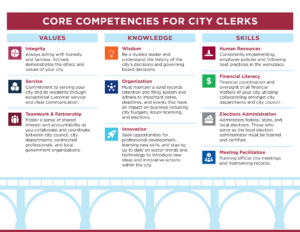 As a city clerk, you are the bridge between the city and your community, and the role of clerk can vary in different cities.
As a city clerk, you are the bridge between the city and your community, and the role of clerk can vary in different cities.
To help all city clerks, the League of Minnesota Cities has developed ten core competencies that can help you succeed in your role. Competencies fall under three categories: values, knowledge, and skills — explore them all below!
View a printable core competencies chart (pdf).
Values
 Integrity
Integrity
Always acting with honesty and fairness and demonstrating the ethics and values of your city.
Examples of integrity as a clerk include:
- Leading by example and placing the needs of your city first while acting in accordance with all laws and policies.
- Ensuring the city complies with the Open Meeting Law and keeping the public informed and included whenever relevant.
 Service
Service
Commitment to serving your city and its residents through exceptional customer service and clear communication.
Examples of service as a clerk include:
- Practicing effective communication strategies.
- Handling correspondence on behalf of the city council.
 Teamwork & Partnership
Teamwork & Partnership
Foster a sense of shared interest and accountability as you collaborate and coordinate between city council, city departments, contracted professionals, and local government organizations.
Examples of teamwork and partnership as a clerk include:
- Collaboration principles that leverage strengths and inclusion.
- Fulfilling the role of facilitator and convener of individuals and groups.
- Garnering support and buy-in from others.
- Understanding the respective roles of city staff and elected officials.
Knowledge
 Wisdom
Wisdom
Be a trusted leader and understand the history of the city’s decisions and governing board decisions.
Examples of wisdom as a clerk include:
- Effective policymaking through listening, prioritizing, and building relationships.
- Being a source of knowledge on important city areas including licensing and land use/zoning.
- Awareness of and adherence to conflict of interest guidelines.
 Organization
Organization
Must maintain a solid records retention and filing system and adhere to important dates, deadlines, and events that have an impact on business including city budgets, liquor licensing, and elections.
Examples of organization as a clerk include:
- Maintaining data storage and records retention.
- Complying with municipal legal requirements.
- Knowledge of ordinances.
- Keeping complete financial records.
 Innovation
Innovation
Seek opportunities for professional development, learning new skills, and staying up to date on sector trends and technology to introduce new ideas and innovative actions within the city.
Examples of innovation as a clerk include:
- Building a culture that embraces innovative ways of getting the work done, including technology and other systems.
- Attending learning opportunities and advancing professional knowledge.
- Peer-to-peer networking or mentorship.
Skills
 Human Resources
Human Resources
Consistently implementing employee policies and following best practices in the workplace.
Examples of human resources as a clerk include:
- Complying with employment laws, including leave laws.
- Demonstrating best practices in recruitment and performance management.
- Understanding labor-management relations and Minnesota labor law under Public Employer Labor Relations (PELRA).
- Maintaining payroll and benefits.
 Financial Literacy
Financial Literacy
Financial coordination and oversight of all financial matters in your city by collaborating amongst city departments and city council.
Examples of financial literacy as a clerk include:
- Accurate fund accounting.
- Ability to prepare a budget and facilitate capital planning.
- Comfortable handling purchasing, payroll, accounts payable, accounts receivable, recoding, and reconciling.
- Understanding what’s required during the auditing process.
 Elections Administration
Elections Administration
Administers federal, state, and local elections. Those who serve as the local election administrator must be trained and certified.
Examples of elections administration as a clerk include:
- Handling candidate filings and notice requirements.
- Following municipal ordinances pertaining to campaign practices and the election calendar.
- Performing ballot preparation and election judge recruitment and duties.
- Maintaining security practices.
 Meeting Facilitation
Meeting Facilitation
Running official city meetings and maintaining records.
Examples of meeting facilitation as a clerk include:
- Providing notice of meetings to the public.
- Adhering to the Open Meeting Law.
- Practicing parliamentary procedure and minute taking.
- Creating and distributing the city council packet.


 Integrity
Integrity Service
Service Teamwork & Partnership
Teamwork & Partnership Wisdom
Wisdom Organization
Organization Innovation
Innovation Human Resources
Human Resources Financial Literacy
Financial Literacy Elections Administration
Elections Administration Meeting Facilitation
Meeting Facilitation




